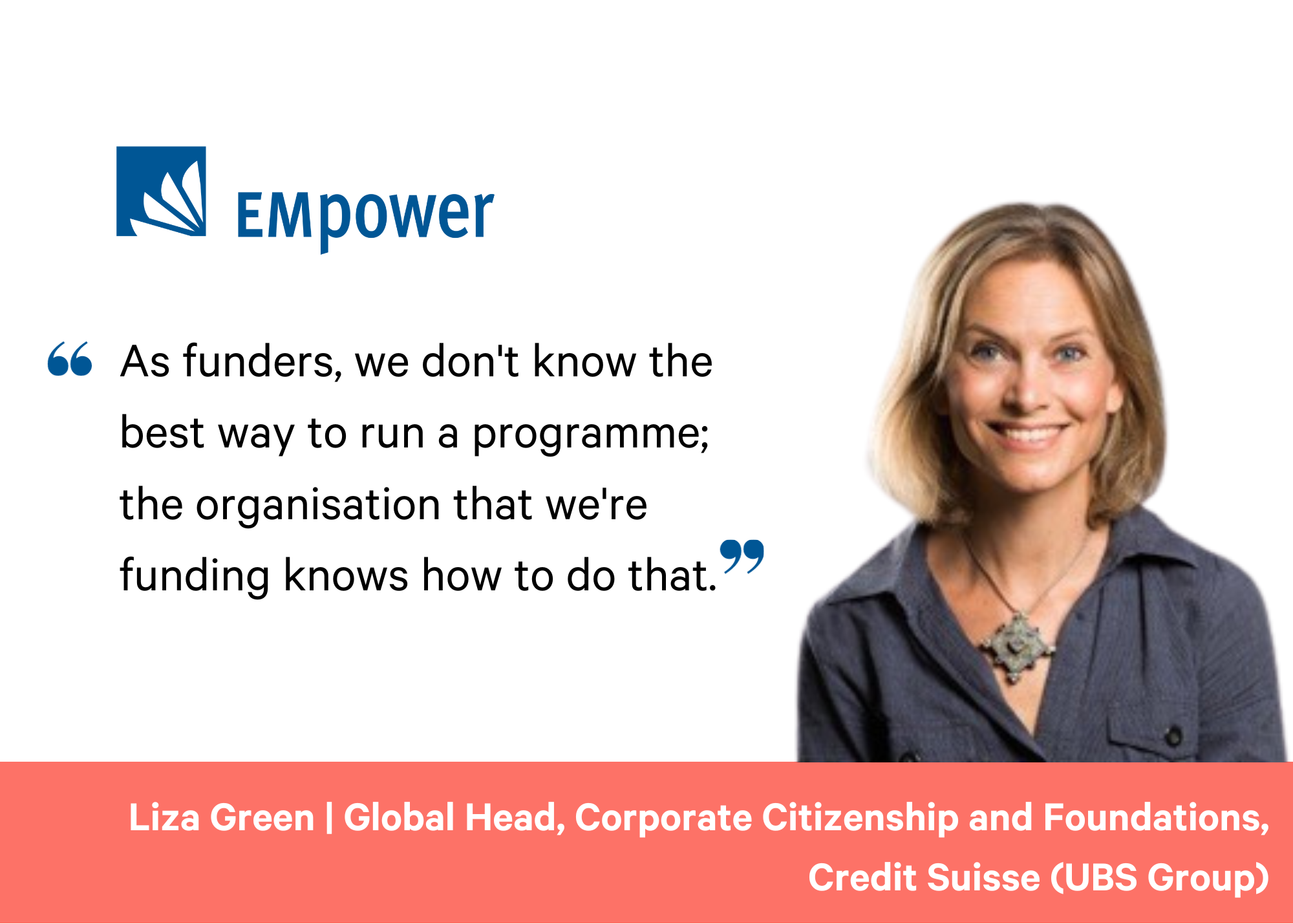Latest News
A Word with Liza Green
Posted 20 December 2023 in EMpower News | Share

Recently, Cynthia Steele, EMpower’s President & CEO, spoke with Liza Green, Global Head, Corporate Citizenship and Foundations at Credit Suisse (UBS Group). They talked about the funder and grantee relationship, trends in philanthropy, and more.
Liza, unlike a lot of folks that are in philanthropy, especially corporate philanthropy, you've always had a broader view of the role of funders—and that cash grants are indispensable. And there are other really valuable roles that funders can play in strengthening civil society and nonprofits. I'd love to hear more about your thoughts on that.
There's always talk about a grant situation being a partnership. It's a partnership between the donor and the organisation receiving the grant, or the grantor and the grantee, for want of a better word. But what does that partnership mean? Going back to what I found as best practices in philanthropy: giving out grants is often going to square one, and really looking at the grant application itself and helping to co-create that. We're aware that a lot of organisations that are applying for funding spend an inordinate amount of time on their grant application. If it's not an iterative process with the grantor, it's a very difficult and challenging process.
I believe that a true partnership actually starts at this application stage. So making sure that it’s a co-authored document that both parties agree to and commit to from that stage helps it be successful. And that sets the stage for a true partnership going forward for the life of the grant. That’s one thing I would say where I found huge value.
Another is being able to explain to people what corporates look for—because we may be people who are in this funding position where we're managing a foundation or a portfolio of funding, but we often have boards that we have to go back to. And allowing them to understand what that process looks like, and what are the questions that are generally asked, also helps them to improve their future applications to other corporates or other funding bodies. And then just some practical examples of what has worked well, including looking at your portfolio of grantees more as a cohort. They are working together, they're not competing for your funding. Once the funding is secured, everyone is in a cohort together. One thing that was very successful in the past was creating a learning circle. Now, this is something that EMpower has done for many years, and there's no reason why all funders can't adopt that approach. Who better to learn from than peer organisations that are facing the same challenges? I would say that's definitely a way you can, as a funder, go beyond just providing financial assistance.
Another piece, obviously, is when you are part of a corporate foundation or a corporate organisation, you have an amazing resource with your employees. How can you harness their skills, their energy, especially their professional skills? Because there's a free source of professional support and technical assistance for your grantees from your employees. Tapping into that, I think, is not always simple. It's not as simple as organising a piece of hands-on volunteering, but I think it's really always very valuable. And then I think actual funding for technical assistance, giving your organisation say 10% or 20% to actually fund technical assistance.
These are such great ideas. You round out the different ways that I think funders can play a really important role in catalysing other kinds of support. Continuing on the theme of corporate philanthropy, you have a really interesting perch, and I wondered if there are trends in corporate philanthropy that you wanted to lift up for our readers, any things that we should have on our radar?
So many to talk about, but one that I think is really important and requires constant repetition: unrestricted funding. It's difficult for people to do, it's difficult for grantors to do. It's particularly difficult in a corporate foundation setting. But it's so important. As grantors, we should be spending a huge amount of time selecting the right organisation to partner with. The due diligence, the review, and the nitpicking should happen at that initial selection stage. Once you're comfortable with that organisation, you should trust them. And that means you're not funding projects, you're funding the organisation to do what they do best. As funders, we don't know the best way to run a programme; the organisation that we're funding knows how to do that, so we should not be getting involved at that level of detail. I think that every single service organisation that's out there delivering needs this message. When you support them, go all in and really do that. It's not necessarily a trend, but it should be an ongoing, ever-present trend when everyone talks about funding.
The other trend, and again, this is going to take more, is looking at philanthropy as concessional funding as well. A lot of people are talking about blended finance, and social finance; how do you make sure that in the social capital spectrum from philanthropy all the way to for-profit investing, that all of those areas are active? Often there's a missing middle. People struggle to get that middle right. And one of the ways is to be open-minded as funders and be that first loss capital, be that concessional funding. If you have ambitions to scale, you're going to need more than philanthropy and grants. How can philanthropy and grants play a role there? It's really in terms of concessional funding, and then the money will come in from the larger investors.
At this time of the year, we're reflecting and thinking about stepping back and renewal. I think that's hard these days for many people because you just open up your newsfeed and see the world is in a very challenging, difficult moment. I'm interested to know, what is it that brings you hope?
I was thinking about this the other day as well: how to end the year, a difficult year for everyone, both for myself and my kids, and how to bring them in a bit more to what I do and what's important to me. Honestly, I came back to the simple thing of taking action and volunteering somewhere. There's nothing that brings things into perspective like giving what you can and being part of a service, any form of service. It brings everything into perspective and it makes you feel better and it takes you out of your head and into just action. I think that's what I'm going to do, and I want to try and keep that practice into next year. We all need a break from our mental turmoil, probably, and we need a break from a lot of things that are going on around us, but we also need community and connection. Everyone has a busy schedule, but I think it's soul food.
Thank you for that. I think we all need to figure out ways, large and small, to bring more hope into our lives and share it with others.
View All NewsMore Latest News
- We are Hiring: Programme Consultant, Peru
- Posted 23 April 2024
- A Word with Prarthana Kumar
- Posted 16 April 2024
- Finding the Power
- Posted 16 April 2024
Upcoming Events
Connect with EMpower
Stay up-to-date on the latest EMpower news, highlights from our grantee partners, upcoming events, and more.
Make a Difference with EMpower
Our Board Directors and the Leadership Council underwrite all of our Management, General and Fundraising expenses, so 100% of your donation goes directly to empowering marginalised young people.

